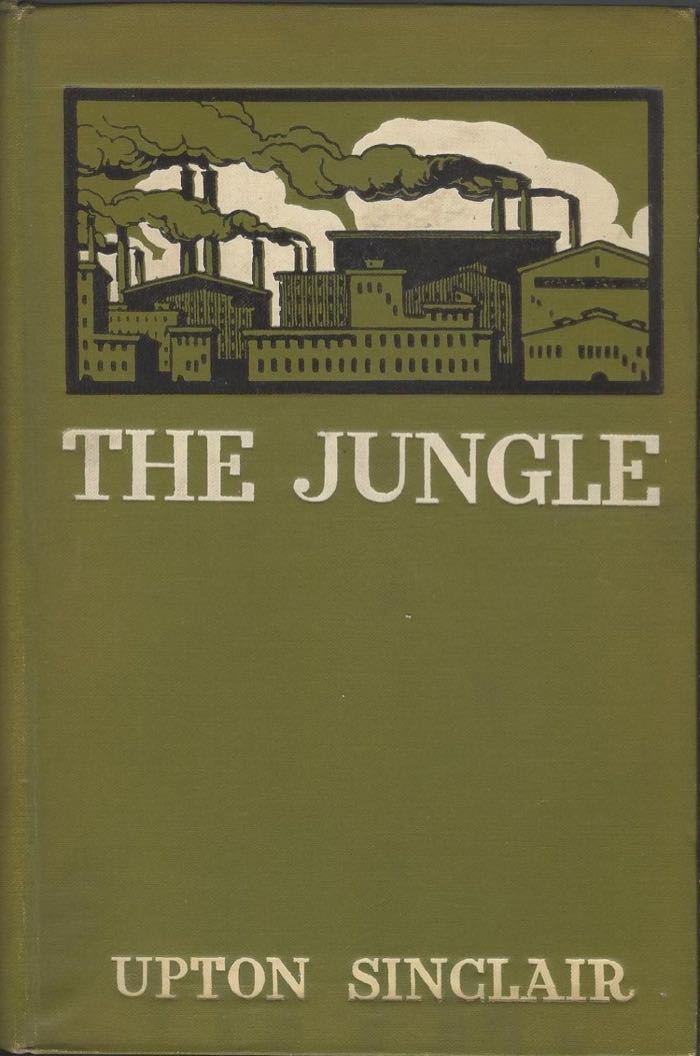The Jungle
Reviewed date: 2007 Jan 21
Rating: 3
342 pages
Upton Sinclair's 1906 novel The Jungle sparked an investigation into the American meat-packing industry that resulted in sweeping new inspection legislation. It is a book of historical importance. But it took me only two chapters to discover that it isn't about meatpacking: it's about socialism.
The Jungle tells the story of Jurgis Rudkus, a poor Lithuanian immigrant who arrives in Chicago with his family, where they are cheated, abused, and taken advantage of in every way possible. Jurgis finds work at stockyards, where safety is non-existent, the bosses drive the men to the brink of death and throw them out on the street when they've been used up. Jurgis's family must all work to keep from starving or freezing to death, but one by one they all succumb to the ravages of unrestrained capitalism.
It is the accounts of the stockyards that caught America's attention, but that is merely a minor point in Sinclair's larger message: capitalism enslaves mankind. Jurgis works stints in the steel industry, at an assembly-line in a manufacturing plant, and as a hobo in the country. There is no way out of his abject poverty and extreme suffering.
Then one day Jurgis discovers socialism. It is a religious experience for him. He talks to the socialists and learns how and why capitalism is evil. Then he gets a cushy job at a hotel run by a socialist. His life becomes one of ease. This is utterly unbelievable, but forgivable because Sinclair intends this to be a glimpse of what a country run on Socialism would have to offer. Just as the depths of Jurgis's suffering before is exaggerated in order for Sinclair to show us all aspects of capitalism's failing, so his good fortune now allows Sinclair to expound at length on the benefits of socialism.
And expound he does. For fifty pages. Socialism is the cure for all society's ills, apparently. No thought is given to how socialism will root out corruption; the capitalist culture of Chicago is thoroughly corrupt, and human nature is not easily changed, but Sinclair offers no solution to the problem of human sin.
Sinclair does take pains to say that not all socialists agree on everything. Some expect socialism to eliminate all religion. Others view it as the natural consequence of following Christ's teachings. But all socialists apparently agree that the current religious institutions are wholly corrupt.
It is difficult for me to judge The Jungle without also judging its message--which I find abhorrent. Perhaps history agrees with me. America has stamped out the kind of poverty and suffering recounted in The Jungle, without resorting to socialism. It was eliminated by 1) workplace safety regulations, 2) consumer products liability, and 3) Social Security.
The Jungle rates a strong three out of five.
There was no place in it where a man counted for anything against a dollar.
[Consider] one single item, the washing of dishes. Surely it is moderate to say that the dishwashing for a family of five takes half an hour a day; with ten hours as a day's work, it takes, therefore, half a million able-bodied persons--mostly women to do the dishwashing of the country. And note that this is most filthy and deadening and brutalizing work; that it is a cause of anemia, nervousness, ugliness, and ill-temper; of prostitution, suicide, and insanity; of drunken husbands and degenerate children--for all of which things the community has naturally to pay. And now consider that in each of my little free communities there would be a machine which would wash and dry the dishes, and do it, not merely to the eye and the touch, but scientifically--sterilizing them--and do it at a saving of all the drudgery and nine-tenths of the time!
